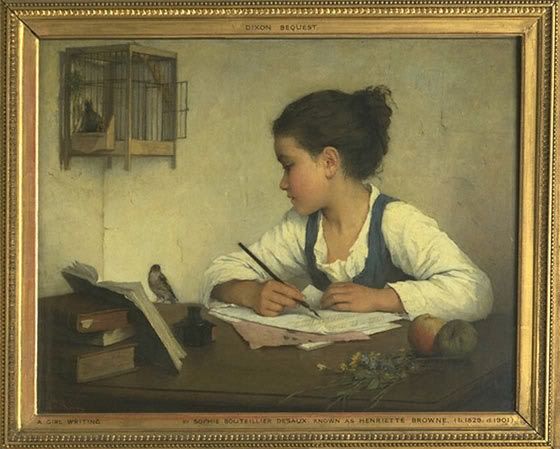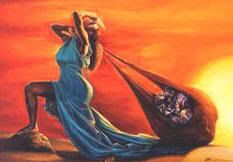In rightly dividing the Word, we are supposed to be listening to what is being taught and then having the
desire to study for ourselves. Take out those notes, our bible and spend time to see if the Word was quoted correctly and if it was used in the proper context. With all of those things in order, then and only then could we use the message in applying it into our lives or to use in discussions or to help someone in their time of need. Anything else without these matters in place is a person in error and causing others to be as well. You will discover this as you continue to read.
In the first part of this post, hopefully the idea that a virtuous woman can only be if she is a house wife has been dispelled. Her priority is in Christ and then doing what He has called her to do. This is the message that I didn't hear and is why I write. The other passages under the guise of "Women's Day" also kept the real message from being expounded upon. I am not sure if the reasoning is trying to only teach what the people can be comfortable in hearing or if the ministers were directed not to
preach such things. I don't have those constraints.
The book of Esther is one of those popular sermons where it has been said, to the group of women I was seated with, that if a woman wishes to keep her husband she should do as Esther has done and not Queen Vashti. It was also reiterated of the respect Esther had for her Uncle Mordeccai and for her husband once she became Queen. She also was obedient which is why she was highly favored (though her looks added to some of the benefit). While I took in these lessons, it wasn't until much later in my own studies did I wonder if the female ministers read the entire book of Esther or just the passages that seemed pertinent for the message. I also wondered if these lessons were from the Lord or something seen on television or recorded and watched to be taught again and again. If so, that was not from the Lord's table. The Lord may have prepared a meal in the presence of our enemies, but rest assured the meal had not been eaten before and regurgitated for us to swallow (Psalms 23:5 AMP).
To understand Esther in the role that was thrust upon her, you must first see the king for who he actually was. He was a foolish man. He held parties that lasted far longer then necessary and the only one enjoying his parties was him (Esther 1:1-8 AMP). He would have the food and drinks placed for everyone but no one would be drinking but him. Then when he called for his wife, Vashti, she was tired having thrown her own party for the women and wasn't about to be humiliated as she has been putting up with the king's drunken behavior before (Esther 1:9-12 AMP). She refused him. The king could have pouted for a moment and been over it. But the princes had to be bored. They were the ones that started thinking that the queen had some influence and would cause for their wives to be just as impassive (Esther 1:16-20 AMP). That was fear doing the thinking for them. Seeing the king was not of a sober mind, he listened and acted on that thought of
fear. This is what caused for the queen to lose her position.
Now Esther, she was a child. Not knowing what happened to her actual parents gives some perspective as to why Esther's demeanor was the way it was. She had been obedient and without a doubt her Uncle, a godly man, prayed for her. We also don't know if her Uncle had anymore children of his own. Assuming that he didn't, because the Word never tells us that he went back to his home or to his wife and family, he kept a close watch on his niece. Never did I ever hear how close knit this family was and why Esther may have felt that way; however when her surroundings changed so did she.
Why do you think Esther went from a humbling, obedient, quiet child that was highly favored to one that was going to give her Uncle a directive? He told her what was needed to be done to save the people and that she was placed in the position for this very reason. Instead of her seeing the big picture, she looked at how she had been trained to do as the king ordered (Esther 4:8-11 AMP). The order was, not to disturb the king unless he called for you. Did you notice how Mordeccai got her head back together (Esther 4: 12-17 AMP)? He reminded her where she came from. She saw her position being greater then the niece of her Uncle. Actually, it was...only Esther was a child and didn't see that. She had a decision to make and this may have been the last time her Uncle could give her a directive to follow. After all, she is the queen and needed to be about serving her husband not her Uncle. But, again, this isn't the message that was taught in the services I attended or those I've seen.
Now this is the part that most female speakers get trapped in and deliver the oration as a show on how to be that domestic engineer that all men desire in a woman. What is ministered is that the woman needs to be able to read her man (know his ways). She should not come at him the moment he comes home, but she should allow him to relax, draw him a bath, serve him a hot meal. Then after he has finished and is in a better state of mind, ask what you will. Then the scripture is used in seeing what Esther did with the king just for him to reconsider what he had ordered (Esther 5 AMP). Yeah right! Did we not establish that Esther is a child? Did we not already establish that she had no clue as to what to do with any man much less her husband? And if you keep reading, she didn't ask him with the first dinner, or the second. What I wondered was, what happened afterward? I mean after the order was over and Haman was executed? Did Esther continue cooking her man's meals or did she have those servants do as they have been hired to do? And isn't that manipulative? Does a man appreciate a conniving woman? Is this seed sown and now her husband can be the same way? Is this the sort of thing a woman hopes the rest of her life must consist of in order to speak to her husband? Its ridiculous, isn't it? It sounds like a hard task to keep up with especially when a woman
never had to go through such foolishness as a single person living her life righteous before the Lord. Why would God make marriage hard for us? Answer: He wouldn't.
The real lesson in Esther for the purpose of Women's Day is the childishness of the king listening to the advice of princes. He got what he deserved. The equivalence of who he is. All of those parties and allowing for those who were not chosen to be king have control of the decision making, got him a wife that was equally yoked with his personality. She was a child easily to be controlled and manipulated. We saw this when Mordeccai told Esther what to do. He was no longer in that position to do that, but she adhered to his direction. The princes told the king what to do. They were not in a position to make that decree themselves and if the king knew his place, he would have put those princes in theirs.
When a woman accepts the proposal of a man, she must know that he has the confidence, assertiveness, and aggression to hold the position as being the head of her. He has some direction of where he would like to be and is appreciative of the help that she is able to give to get him there. If its all about him and he doesn't love her as Christ loves the church, and therefore should expect all sorts of trouble. Because this man will be asking advice of all sorts of matters that should be left to you, him, and God - only!
Wednesday, December 4, 2013
Subscribe to:
Post Comments (Atom)







No comments:
Post a Comment